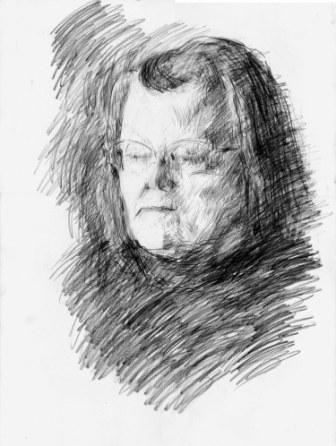Language is a means of exploration. When you explore, you don’t want to get somewhere familiar to you. It doesn’t need to be a place where no man has ever been, but it must be sufficiently unknown not to be cut and dried. (Walker Percy) When I finished writing this post, I realized I had come to a different conclusion than I thought I would.
In the first nine years of my life, we lived in nine houses in the same village. I remember something about each one of them. In the one we lived in the shortest time, I only remember a cubbyhole under the stairs. Once I asked my aunt why we had moved so often. She seemed surprised at the question. She said that we rented houses that were for sale, that my mother (with my aunt’s help) would paint and wallpaper and make the place so lovely that it would soon be sold. At last my parents were able to buy a late Victorian house which my mother transformed into a warm, welcoming, beautiful home. The day before she slipped into a coma from which she never returned, she went around tearing wallpaper off the den in a frenzy to get it re-done. Two months after she died, I went with my family to comfort my father, and my husband helped him put on the wallpaper she had chosen.
Creating a home and creating a family are the two most important constructions most of us will ever make. I don’t think I ever felt disoriented when we moved because like the snail we carried our house with us: my mother’s aesthetics, the intense love both my parents radiated towards me. I have never had as much pleasure in creating a home as my mother had. For one thing the house that we bought 40 years ago has been a source of tug of war with my husband, and I soon gave up the struggle, evolving an ambiguous pleasure/pain relationship with it. I just realized that the central characters of my novels (all women) don’t take much delight in their houses either. I do remember that when we were buying the house, I wanted a new, small house rather than a big Victorian one because I didn’t want to be as completely devoted to it as my parents were. My father was an artist, but he gave up painting when they bought the house, putting all his spare time and effort into renovation. I wanted to write novels and was afraid that devotion to a house would interfere with that. Perhaps my mother too had this ambiguous attitude to her houses: all that work on eight of them before she had one of her own, her vision constrained by a lack of money. Perhaps many women have this feeling. Women’s magazines and TV house programs present an ideal that can never be emulated and that must be frustrating.
A further paradox is that I fervently believe in the great value there is in constructing a home to shelter the family. Several of my favorite books deal with the importance of houses as sanctuaries, The Poetics of Space by Gaston Bachelard and the Eliots of Damerosehay trilogy by Elizabeth Goudge among them.
Wednesday, April 05, 2006
Subscribe to:
Post Comments (Atom)

2 comments:
"Women’s magazines and TV house programs present an ideal that can never be emulated and that must be frustrating."
Then imagine when, like me, your home is the world and the people in it your family. This is not a facile observation. Having had more than 45 'homes' of three months or more.
I reread Elizabeth Goudge's Scent of Water every year toward Christmas, primarily for the sense of sanctuary and peace, the Spirit of Place she describes so eloquently. I have major issues with her theology, but she delineates a whole world in a paragraph...
Post a Comment